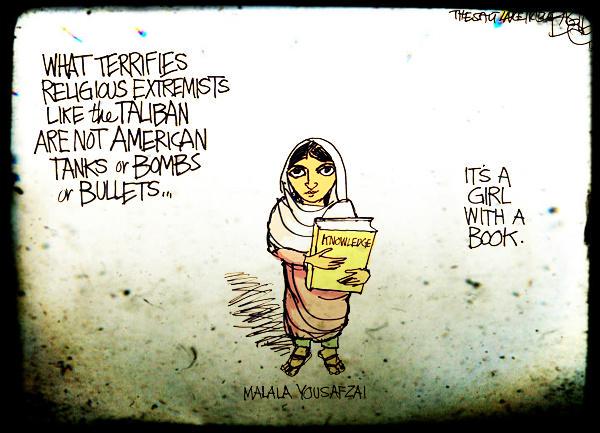Education As A Tool For Disrupting Terrorism
Karl Mehta | February 2, 2016
Still, education is the enemy of radicalism.
Many voices offer solutions to this ever-growing problem, and maybe the most insightful is that of Malala Yousafzai. Since winning the Nobel Peace Prize, this remarkable young woman has campaigned for investment in education in developing countries.
 |
| Source: https://twitter.com/tomthunkitsmind/status/641049633473626112 |
<more at http://techcrunch.com/2016/02/02/education-as-a-tool-for-disrupting-terrorism/; related links: https://twitter.com/tomthunkitsmind/status/641049633473626112 (“With guns you can kill terrorists—with education you can kill terrorism.” Malala Yousafzai. September 7, 2015) and http://www.nber.org/papers/w9074 (Education, Poverty, Political Violence and Terrorism: Is There a Causal Connection? Alan B. Krueger and Jitka Maleckova. NBER Working Paper No. 9074. Issued in July 2002 [Abstract: The paper investigates whether there is a causal link between poverty or low education and participation in politically motivated violence and terrorist activities. After presenting a discussion of theoretical issues, we review evidence on the determinants of hate crimes. This literature finds that the occurrence of hate crimes is largely independent of economic conditions. Next we analyze data on support for attacks against Israeli targets from public opinion polls conducted in the West Bank and Gaza Strip. These polls indicate that support for violent attacks does not decrease among those with higher education and higher living standards. The core contribution of the paper is a statistical analysis of the determinants of participation in Hezbollah militant activities in Lebanon. The evidence we have assembled suggests that having a living standard above the poverty line or a secondary school or higher education is positively associated with participation in Hezbollah. We also find that Israeli Jewish settlers who attacked Palestinians in the West Bank in the early 1980s were overwhelmingly from high-paying occupations. The conclusion speculates on why economic conditions and education are largely unrelated to participation in, and support for, terrorism.])>

No comments:
Post a Comment